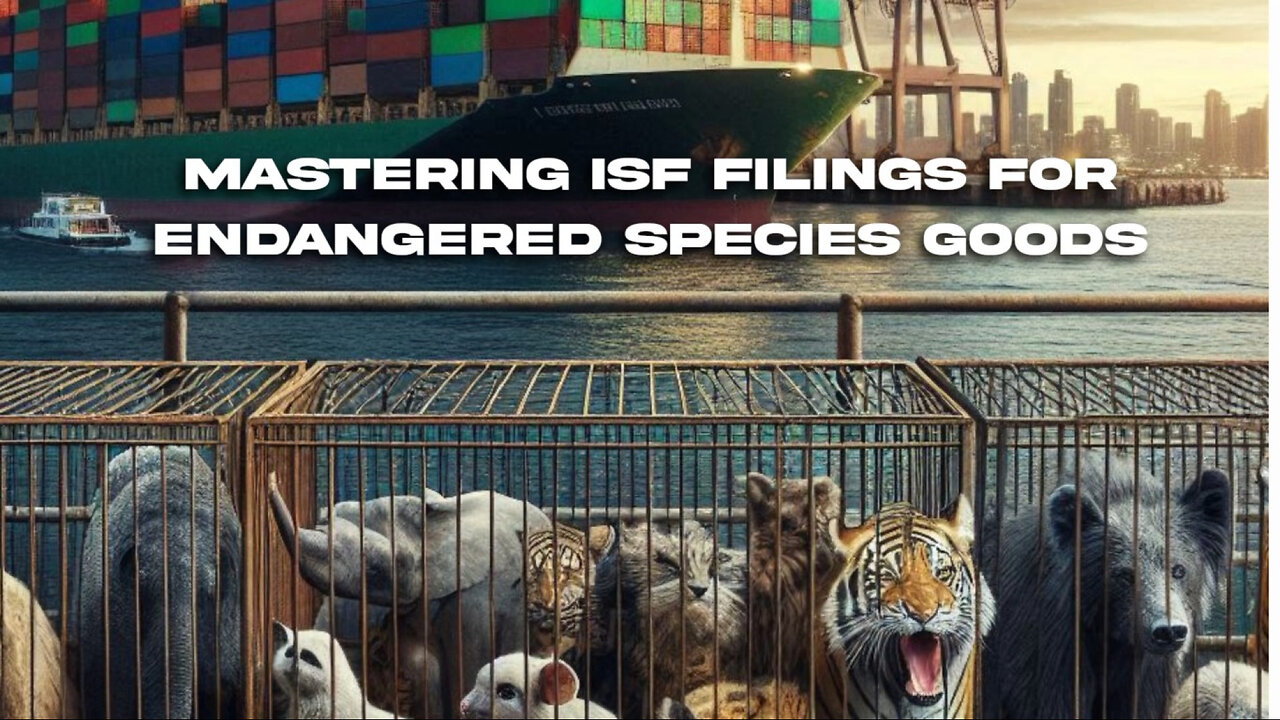Premium Only Content

Navigating Endangered Species Regulations: Filing ISF for Imports
ISF Cargo | Phone: 786-865-0459
Email: isf@isfcargo.com | https://isfcargo.com
In today's episode, we discussed the specific requirements for filing the Importer Security Filing (ISF) for goods subject to endangered species regulations in customs brokerage. The ISF, also known as 10+2, is a mandatory filing requirement that provides vital information to US Customs and Border Protection about imported cargo in advance of its arrival.
To properly file the ISF for endangered species goods, accurate Harmonized Tariff Schedule (HTS) classification is crucial. The HTS code determines the applicable regulations and requirements for the shipment, so it is essential to identify the correct code for the specific product being imported.
Comprehensive documentation is another key requirement when filing the ISF for endangered species goods. This documentation includes permits, licenses, and certificates related to the importation and serves as evidence of compliance with local regulations and responsible trade practices.
Declaring the specific species involved in the importation is necessary when filing the ISF for endangered species goods. This information allows customs authorities to take appropriate control measures to prevent the illegal trade of endangered species and supports international conservation efforts.
In many cases, specific permits, licenses, or certificates are required to import endangered species goods. It is important to work closely with customs brokers and local authorities to ensure that all necessary permits are obtained before filing the ISF.
Compliance with the Convention on International Trade in Endangered Species of Wild Fauna and Flora (CITES) is crucial when importing goods that fall under its jurisdiction. Additional documentation, permits, or certification may be required to demonstrate adherence to CITES guidelines.
Filing the ISF for endangered species goods requires meticulous attention to detail and adherence to specific requirements. Accurate HTS classification, comprehensive documentation, proper declaration of species, obtaining necessary permits, and compliance with CITES regulations are all essential for a successful customs clearance process. We hope this episode has provided valuable insights into this topic, and we look forward to exploring more aspects of customs brokerage and international trade in future episodes. Thank you for watching!
#usimportbond #isfcustomsbroker #uscustomsclearing #isfentry
Video Disclaimer Here: This content is for educational use and not associated with any US government body.
00:57 - HTS Classification
01:32 - Documentation
02:00 - Declaration of Species
02:27 - Wildlife and Endangered Species Permits
02:53 - CITES Compliance
-
 26:10
26:10
Mrgunsngear
12 hours ago $5.05 earnedRomanian RPK Review: The Warsaw Pact's M249 SAW
41.3K6 -
 1:52:40
1:52:40
StaleSavage
10 hours agoCrows Nest Gaming Community
113K2 -
 51:17
51:17
Man in America
14 hours ago🚨 CCP’s SECRET WAR on America—Military Insider Sounds the ALARM! w/ Matthew Newgent
68.4K33 -
 6:53:51
6:53:51
SpartakusLIVE
11 hours ago#1 HACKER gets UNBANNED || The MASSES Rejoice, The Accusers TRIGGERED
88.4K1 -
 54:33
54:33
Flyover Conservatives
1 day agoThe #1 Mistake Singles Make That Keeps Them Alone Forever - Jackie Dorman | FOC Show
70.7K4 -
 1:06:32
1:06:32
PMG
1 day ago $3.15 earned"372 Duodecillion Possibilities: COVID Complexities & Long COVID Remedies w/ Dr. Bryan Ardis"
37.9K6 -
 1:06:41
1:06:41
Donald Trump Jr.
15 hours agoDOGE Keeps Digging as Dems Keep Deceiving, Live with Lawyer Paul Moore & Entrepreneur Barry Habib | Triggered Ep. 216
155K96 -
 1:07:37
1:07:37
Slightly Offensive
9 hours ago $7.91 earnedTrump to FINALLY end UKRAINE WAR?! Putin AGREES | Nightly Offensive
64.4K33 -
 59:28
59:28
The StoneZONE with Roger Stone
11 hours agoTrump’s Divine Presidency: Pastor Randy Coggins II on Faith, Family, Freedom | The StoneZONE
53.9K5 -
 5:58:58
5:58:58
VOPUSARADIO
2 days agoPOLITI-SHOCK! SPECIAL 8 PM EST START! "TRANSFOMATIVE CHANGE IS COMING"! END THE FED!!
31.2K